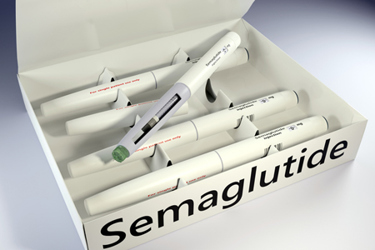Another One For Ozempic? Investigator Recounts Trial For Chronic Kidney Disease
A conversation with Richard E. Pratley, MD, senior investigator, AdventHealth Translational Research Institute

Hardly a day goes by that we don’t hear that catchy jingle based on the 1970s hit “It’s Magic” or come across a headline declaring a celebrity has turned to a certain prescription to manage their weight. Lighthearted though those references may be, they do underscore our collective cultural focus on the pharmaceutical blockbuster that is Ozempic.
Ozempic, also known as semaglutide, is among a host of GLP-1 agonists that researchers are exploring — and the FDA is approving — for the treatment of diabetes, obesity, cardiovascular risk reduction, weight management, and perhaps chronic kidney disease. And that’s where Richard E. Pratley, MD, comes in.
Pratley is co-Chair of the Steering Committee and the senior author on a recent study published in the New England Journal of Medicine (NEJM) that explores the benefits of Ozempic in Type 2 diabetes patients with chronic kidney disease. The Phase 3 study, called FLOW, evaluated the efficacy and safety of Ozempic in people with T2D and chronic kidney disease in preventing kidney failure, substantial loss of kidney function, and death from kidney or cardiovascular causes. Results indicate that the drug “reduced the risk of clinically important kidney outcomes and death from cardiovascular causes.”
Clinical Leader recently chatted with Pratley about his positive experience working with Novo Nordisk and the challenges of executing the trial amid the COVID-19 pandemic and changing standard-of-care landscape.
Clinical Leader: Was the FLOW study an investigator-initiated or sponsor-led trial? And how did your partnership with Novo Nordisk begin?
Pratley: I've been involved with Novo Nordisk on multiple trials in the past, sometimes as the signatory investigator. I co-Chaired the Global Expert Panel for one of their other cardiovascular outcome trials with liraglutide called LEADER. So, this was an evolution of that relationship. We looked at data from LEADER and thought there might be a signal for a kidney benefit. And that was when we started to have discussions with company leadership promoting the idea of doing a dedicated kidney outcomes trial with their new medication, Ozempic. It was a two-way process between the academic leaders and the sponsor and a really good partnership, I would have to say.
Having worked with Novo Nordisk before, what did you enjoy about their trials and the overall partnership? What makes you continue to work with them?
I value their transparency and their commitment to doing what's in the best interest of the patients. They didn't necessarily need this kidney trial to sell Ozempic — this stuff is selling itself. But there is a high unmet need out there. We've recently been able to develop new treatments for chronic kidney disease. Some of them slow the progression of kidney disease, but they don't save lives per se.
It was this transparency, an openness to a dialogue, a willingness to listen and then support these sometimes out-of-the-box ideas, which is a major commitment. These trials are hugely expensive.
And honestly, I've done a number of these trials and worked with different sponsors. Some try to do it on the cheap and save money here and there, but Novo always does the right thing and that results in the best science. At the end of the day, you're very confident in the results of the trial.
Looking specifically at the FLOW trial, what were the successes or challenges in getting it up and running?
First of all, this is a more challenging population than the typical population with diabetes because of requirement for chronic kidney disease. And the investigative sites that actually recruit and study the patients are probably fewer than those for a typical diabetes trial, for example.
The second challenge was that to achieve the outcomes we wanted to achieve within a reasonable time frame, we had to specify stringent criteria for chronic kidney disease. That markedly limits the population you can draw from, and it makes it even more difficult to recruit.
The third challenge we faced was COVID-19. We were three or four months into recruitment and ahead of the curve, and then things just stopped, understandably.
But as soon as the sites were able to get back and start seeing patients, we resumed recruitment and got back on track. That's a testament not to me but to Novo for working with the sites and coming up with innovative ways to have virtual visits and deliver drugs directly to patients. A variety of innovations were instituted around the time of COVID-19 to get the trial back on track, and I must say that they were very successful, so we ended up recruiting on time and were able to keep the vast majority of the patients in the trial. That's huge. It's huge in terms of the success of the trial but also in the cost of the trial. If trials are delayed, it's very expensive. So that was great work. Novo came to the table with a lot of support that helped to make things work in the unprecedented setting of the pandemic.
Let's look more closely at the patients. What accommodations were included in the trial design and protocol to meet these patients’ needs?
This was a pretty functional group, even though they have a high risk of chronic kidney disease and a high burden of cardiovascular disease. In the face of the pandemic, we were forced to switch to virtual meetings, and people adapted to those and did just fine. We also had 14 sites in Ukraine and Russia so we had to accommodate this disruption. Overall the sites and the sponsor did an amazing job. They were able to keep all of their patients in the trial and complete the trial despite the situation in Ukraine.
In a recent AdventHealth press release, you mentioned wanting semaglutide (Ozempic) to become the standard of care for patients with Type 2 diabetes and chronic kidney disease. What is the current SOC?
That has actually evolved during the execution of this trial. For two and a half decades, we just had renal angiotensin blockers, ACEs and ARBs that slowed the progression of chronic kidney disease. Then around 2018 and 2019, it became evident that the SGLT-2 inhibitors had powerful effects, and they became standard of care during the recruitment for this study and the execution of the study. Because of that, we had to allow people on these medications to enroll in the study because that's ethically what is required. That affected the study because we had to add more patients to accommodate the potential loss of power as a result the effect of these drugs.
Then another drug, the mineralocorticoid receptor antagonist Finerenone was also recently approved for diabetes and chronic kidney disease. This illustrates how the evidence base in medicine is always evolving, and trials need to adapt, sometimes in midcourse, to be both ethically sound as well as to take into account where the field is going and be relevant in the next few years.
It ended up that about 15% of patients were on SGLT-2 inhibitors at baseline and another 15% started drugs. But it turns out that our power estimates and our adaptation during the trial were more than adequate, and that's why our data and safety monitoring committee stopped the trial early.
So, you're conducting this trial and Ozempic is starting to become part of the lexicon. What was going through your mind at the time this was blowing up in popularity? Were you excited? Were you concerned?
Both. By that time, everybody was enrolled and people already understood why we're doing the trial — the drug, the risks, and so on. Historically, we've had a little bit of a challenge getting people on these medications in clinic, despite their efficacy. What the popular press did was open that door so people started to hear about it and started to be curious. In my diabetes clinic, my patients started to ask about the medications and were much more receptive to starting a new medication – even one that had to be injected.
Because patients were also asking their primary care docs about this new medication, more and more primary care docs — where the vast majority of patients with diabetes are cared for — started to learn about the medication and started to prescribe it. That has really opened the gates more than anything. More than any direct-to-consumer marketing, more than any clinical trial, it's that grassroots pull of patients who are interested in achieving results and asking their doctors how to make it happen.
Given your successful relationship with Novo Nordisk on this trial and others, what advice or insights can you share directly with sponsor companies about trial design or being a better partner?
Two bits of advice. One is to listen to the experts. We had a diverse group in our steering committee including nephrologists, cardiologists, and endocrinologists, each with a different perspective, and it was that collective wisdom that helped design this successful trial.
The second is to be bold, because in doing so, by going out on a limb, pursuing this as a potential indication, the opportunity exists now for helping millions of people, not just to avoid kidney disease but also avoid heart disease and mortality. When we first presented the results of the trial we summarized it by saying that through the FLOW study, we were “Saving hearts, kidneys, and lives.” And that's a pretty powerful message.
About The Expert:
 Richard Pratley, MD, is a board-certified internal medicine physician and nationally recognized diabetes expert with advanced training in gerontology, geriatrics, and clinical physiology and metabolism. He sees patients at AdventHealth Medical Group’s diabetes and endocrine specialty practice in Orlando and The Villages while also serving as the medical director of the AdventHealth Diabetes Institute and as a senior scientist in diabetes research for AdventHealth. He is a leading authority on new and emerging treatments for diabetes and its comorbidities, which is why many area physicians refer their patients to him for advanced diabetes care. Dr. Pratley earned his medical degree at Wayne State University in Detroit and undertook his residency at the University of Michigan. He next completed three consecutive fellowships in clinical physiology and metabolism, gerontology and geriatrics, and geriatrics at the National Institute on Aging in Baltimore, Johns Hopkins University, and the University of Michigan, respectively.
Richard Pratley, MD, is a board-certified internal medicine physician and nationally recognized diabetes expert with advanced training in gerontology, geriatrics, and clinical physiology and metabolism. He sees patients at AdventHealth Medical Group’s diabetes and endocrine specialty practice in Orlando and The Villages while also serving as the medical director of the AdventHealth Diabetes Institute and as a senior scientist in diabetes research for AdventHealth. He is a leading authority on new and emerging treatments for diabetes and its comorbidities, which is why many area physicians refer their patients to him for advanced diabetes care. Dr. Pratley earned his medical degree at Wayne State University in Detroit and undertook his residency at the University of Michigan. He next completed three consecutive fellowships in clinical physiology and metabolism, gerontology and geriatrics, and geriatrics at the National Institute on Aging in Baltimore, Johns Hopkins University, and the University of Michigan, respectively.
